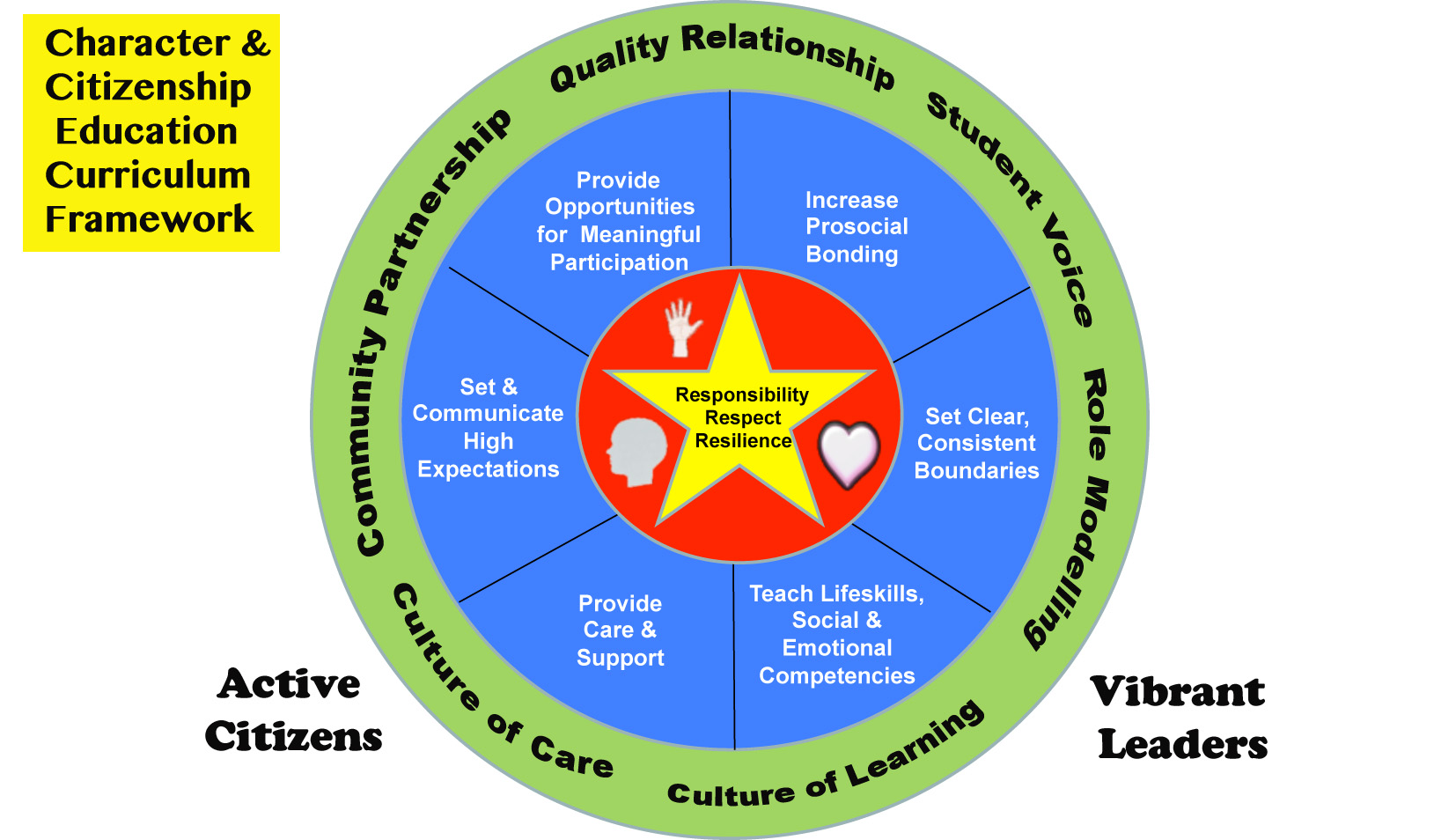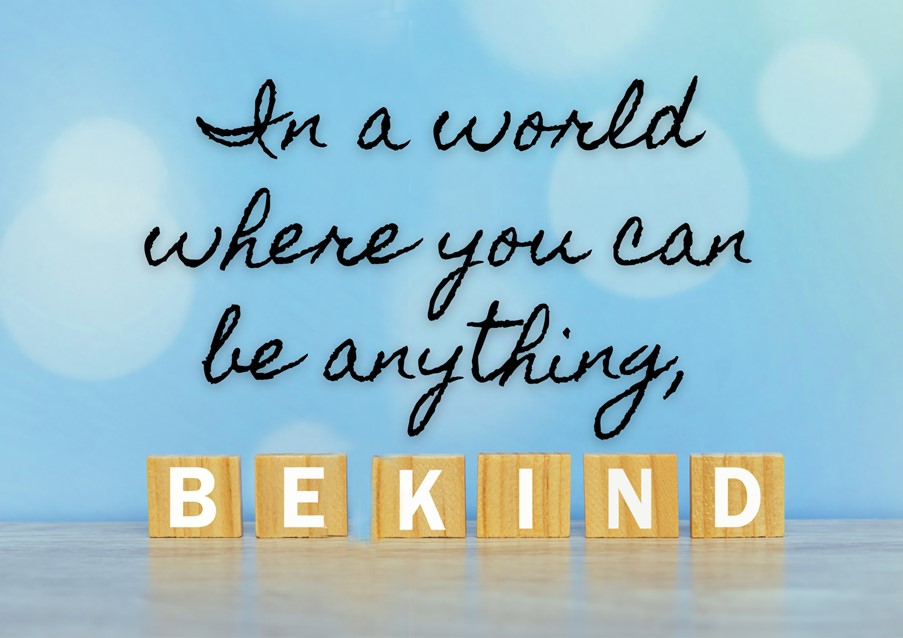Character and Citizenship Education
Character and Citizenship Education
‘Active Citizens, Vibrant Leaders’
Woodlands Ring Secondary School believes in holistic education for every child; Character and Citizenship Education (CCE) being the cornerstone of their development and the true goal of education. Aligned to Thomas Lickona’s Educating for Character framework of ‘Moral Knowing, Moral Feeling and Moral Action’ and Henderson & Milstein’s Resiliency Wheel, CCE is anchored in the school’s Core Values of Responsibility, Respect and Resilience. It also incorporates the three big ideas of CCE - Identity, Relationships and Choices - in developing students.
Character and Citizenship Education is operationalised using the CCE Framework.

The star represents our student, WRS Star, who lives by the core values of Responsibility, Respect and Resilience (3Rs).
The innermost circle shows our core belief of why we teach Character and Citizenship Education (CCE) in WRS. The head - teaching for awareness, the hand - teaching for application and the heart - teaching for advocacy.
The middle circle represents the Resiliency Wheel. Each part indicates what the teacher does to bring about the desired student outcomes. Doing this for our students helps to build resilience in them. Resilient students are successful students.
The outer circle illustrates how the school culture is developed to support student learning, growth and development into active citizens and vibrant leaders. These are the desired outcomes we want to see in the students as they participate actively in the school’s CCE programme.
In short, it is a framework of what we do, why we do and how we do things.
An integral part of this framework is the teaching of Social and Emotional competencies. This has been found to result in greater school success. Thus, a school-wide integrated approach is used to help every child learn these competencies well.
We also believe in helping every student become a leader of his/her own life. It requires a student to take charge of his/her learning as a 21st Century global citizen.
To enable our students to thrive in a future environment that is driven by technological advancement and globalisation, we equip them with the emerging 21st Century Competencies (21CC) necessary for the globalised world we live in. These are Civic Literacy, Global Awareness and Cross-Cultural Skills (CGC); Critical and Inventive Thinking (CIT); and Communication, Collaboration and Information Skills (CCI). These competencies will enable students to tap into rich opportunities present in the emerging digital age, while keeping a strong Singapore heartbeat. This is accomplished through actively engaging students in the organising and planning of school-wide events as well as participating in various meaningful community projects. Through their active involvement, the heart to serve and contribute back to the community will be nurtured, realising the School Vision that ‘Every WRS student is Worthy, Resilient and Selfless’.
The following provides information on the approach taken to growing every student into becoming Active Citizens and Vibrant Leaders.
1. Character Education Lessons - Head / Moral Knowing
Objective:
To facilitate learning of core values, social and emotional competencies, and citizenship dispositions, with a focus on developing a sense of purpose in our students.
• The one-hour lessons are time-tabled in the formal curriculum.
• The school also leverages key Student Development Experiences to provide students with rich and authentic opportunities for CCE beyond the classroom.
• Seven broad areas are taught in these lessons, which include Values Education, Leadership practices, Cyber Wellness, Sexuality Education and Education & Career Guidance, Mental Health and Family Education. The lessons are aligned to key Student Development Experiences and school celebrations to ensure students apply what is learnt in class to these special events. Students will carry out reflection on what is learnt during these events to internalize their learning.
2. Citizenship Education - Head and Heart / Moral Knowing and Moral Feeling
Objectives:
To enable students to become responsible, respectful and resilient in all domains of their lives - home, school, community, nation and the world;
To build in students a sense of belonging to the nation, a sense of hope in themselves and the future, an awareness of the reality of Singapore’s vulnerabilities and constraints, and the will to act on improving the lives of others and building a future for our nation.
• The Citizenship Education (CE) programme engages students in various programmes to enable them to understand their role in the world. This is done through getting students to think about national and world issues, drawing students into meaningful discussions and building students’ capacity for compassion.
• Platforms designed for this purpose include conversations during CCE lessons, in-house Citizenship Ceremony, Commemoration of Key Events, cohort learning journeys and the NE Quiz.
3. Values in Action (VIA) - Hand and Heart / Moral Action and Moral Feeling
Objectives:
To facilitate the application of Social and Emotional competencies, values and 21st Century skills;
To enable students to actively contribute to the community.
a. The programme employs the Service-Learning strategy so that students learn through serving others. In this way, students learn to appreciate diversity and place others’ interest before self.
b. Through these meaningful activities, we hope to raise the self-esteem of students so that they become confident citizens, and know that they can contribute in many ways to the community.
c. Students will go through the Service-Learning experience as follows:
- Sec 1: Care for Social/Physical Environment in School
- Sec 2: Care for Environment outside school
- Sec 3, 4 & 5: Student initiated Service-Learning projects.
d. Global Classroom Experiences (GCE) provide students with an opportunity to develop their 21st century competencies of global awareness and cross-cultural skills. To prepare the students for the challenges of a globalized world, opportunities are created for them to be exposed to different cultures, such as interaction with students from different countries, especially from ASEAN and China, to broaden their perspectives and deepen their appreciation for other cultures.
VIA Guidelines
a. 6 hours of VIA participation is expected of all students every year for personal development through Community Service.
b. Parents’ support is very much appreciated to enable participation at all Community Service events.
c. Students will take part in the Service-Learning activity if it falls on the CCA day. Attendance at CCA will be marked as present for the day.
d. Students will forgo the Service-Learning activity if it coincides with:
- Inter-School Competitions;
- Preparation for school-event, e.g. Public Performance.
e. Students will be required to submit valid documents to the Form Teacher to account for their absence.
4. Student Leadership Development
Objectives:
To build the leadership capacity of students using “The Leadership Challenge”;
To enable students to make a difference in the community as leaders.
Students are trained according to the following levels:
-
Level 1: All students will be equipped to lead themselves through school-wide events and platforms of learning through our Learning for Life Programme (LLP) sessions;
-
Level 2: Class Leaders (Chairpersons and CCE Ambassadors), Junior Peer Support Leaders, Junior Student Councillors and Junior CCA Leaders will be equipped to lead their peers;
-
Level 3: Senior Peer Support Leaders, Senior Student Councillors and Senior CCA Leaders will be equipped to lead in school-wide events;
-
Level 4: Members of Student Leadership Council will be equipped to be mentors of other leaders.
5. Environmental Education (EE)
Objective:
To develop every WRS student to be environmentally responsible.
- The WRS Environmental Education plan is a comprehensive school-wide programme to educate the school population on environmental awareness and conservation through integration with Service-Learning activities and school-wide celebrations.
- It is also integrated into various subject areas in order to immerse the school into a culture of environmental awareness and conservation.
6. Education and Career Guidance (ECG)
Objectives:
To deepen students’ understanding of self and relate schooling to different education and career pathways.
To equip students with the necessary knowledge, skills and values to make informed education and career decisions.
- The WRS ECG Curriculum is aligned closely to the national movement, SkillsFuture, and the CCE Syllabus 2021. WR ECG lessons are conducted within the CCE curriculum with the focus on the ECG theme, Becoming My Best Self. The focus allows students to develop self-awareness as they explore their strengths and abilities and equip themselves with the necessary knowledge, skills and values to make informed decision for their education and career pathways.
- Besides the compulsory CCE(ECG) lessons per year, enrichment programmes are also customised to enhance the learning opportunities and deepen students’ interests and motivation towards learning. These programmes include:
- Visits to Institutes of Higher Learnings
- In-House Academic and Career Talks
- Workshops
- Competitions
- The ECG Counsellor also provides individual counselling and group guidance to guide students to make informed decisions about their education and career plans.
7. Student Recognition
Objective:
To increase school pride and sense of belonging.
- At the class level, the Values-based Best Class Competition encourages the building of a vibrant and positive class climate.
- At the student level, the Principal’s Book Prize, Most Improved Student Award and the 3Rs awards are given out to recognise students with outstanding character. In addition, students are also nominated for various awards, for example, Edusave Character Award (ECHA), Singa Award and Outstanding All-Round Student Award to further recognise students who are outstanding in behaviour and/ or contribute to school.
- Student Voice is valued and platforms such as the Students’ Forum and various student-led activities are put in place for greater student involvement.


